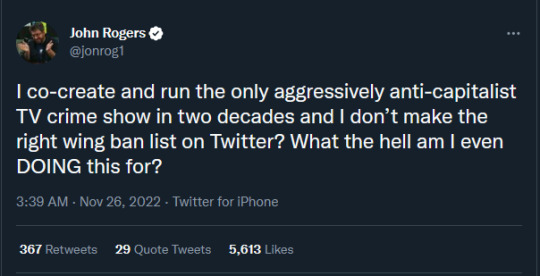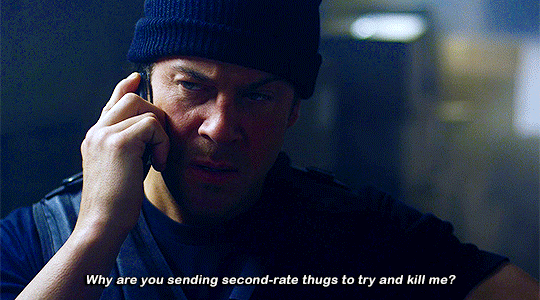Photo


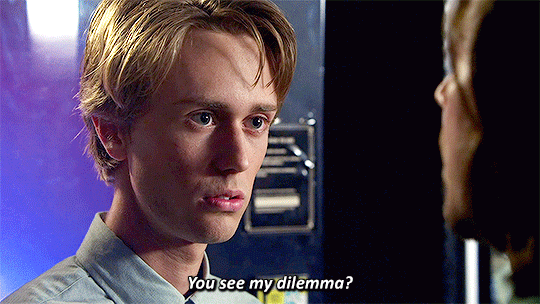
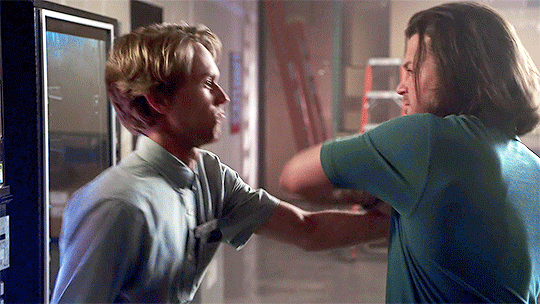
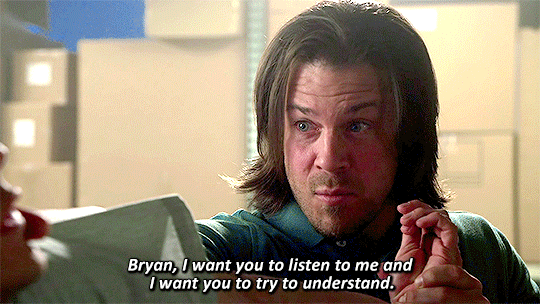



“In the original draft, first draft, Eliot beats the hell out of this guy and you are emotionally invested in him beating the hell out of this guy. And when it came in, Chris and I read it and we were doing the notes and I’m like, you know what, it’s just we’ve seen Eliot struggle with murderers. This is so one-sided it’s - and if the show is really about power dynamics, if the episode is about how people in small towns are bullied by big companies, we can’t have our guy be a bully.” - John Rogers, The Low Low Price Job DVD Commentary
5K notes
·
View notes
Text


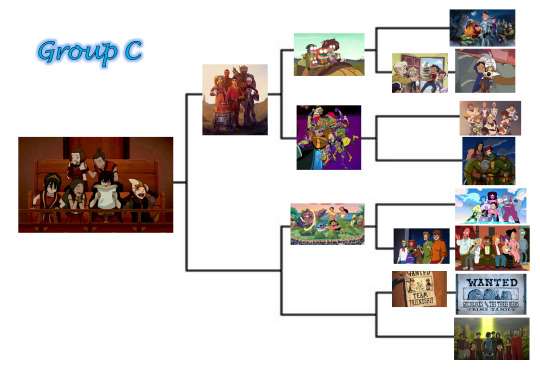

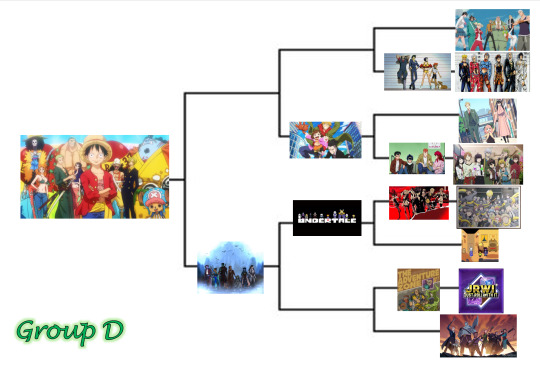
FINAL SHOWDOWN OF ULTIMATE DESTINY:
Gaang (Aang, Katara, Sokka, Toph, Suki, Zuko) from Avatar: The Last Airbender
VS
Leverage Crew (Nate Ford, Sophie Devereaux, Eliot Spencer, Parker, Alec Hardison) from Leverage

#img: ensemble#note: ok so like we’re probably not going to win against atla bc of sheer numbers BUT WE CAN STILL TRY#note: either way i’m proud of the found family of my heart 💕
2K notes
·
View notes
Text

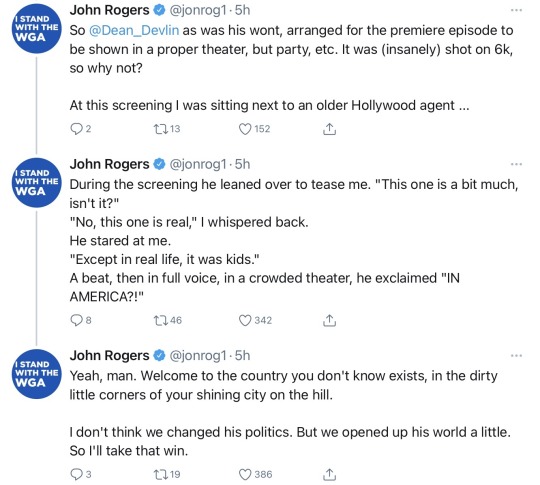
BREAKING: Joe Biden today signed an executive order ending new federal contracts with private prisons.
This is great news, and a reminder of one of my three favorite memories from LEVERAGE (longtime humans know this one, you can skip)
The S2 finale -- which would have been a perfectly good series finale -- left Nate Ford in the hands of law enforcement. And Portland had this perfectly good empty prison sitting there. So S3 started with an episode about Nate, in prison, discovering a cash-for-inmates scam.
This episode was of course based on the famous "kids of Cash" scam where two PA took kickbacks to jail over 2000 kids. https://en.wikipedia.org/wiki/Kids_for_cash_scandal
So @Dean_Devlin as was his wont, arranged for the premiere episode to be shown in a proper theater, but party, etc. It was (insanely) shot on 6k, so why not?
At this screening I was sitting next to an older Hollywood agent ...
During the screening he leaned over to tease me. "This one is a bit much, isn't it?"
"No, this one is real," I whispered back.
He stared at me.
"Except in real life, it was kids."
A beat, then in full voice, in a crowded theater, he exclaimed "IN AMERICA?!"
Yeah, man. Welcome to the country you don't know exists, in the dirty little corners of your shining city on the hill.
I don't think we changed his politics. But we opened up his world a little. So I'll take that win.
Axios | John Rogers (thread)
14K notes
·
View notes
Text
entranced by Nate and Sterling’s whole thing because I’ve never seen two such swagless men have such an intense homoerotic rivalry. representation for men who are like if magneto and charles xavier shopped at men’s wearhouse.
2K notes
·
View notes
Text

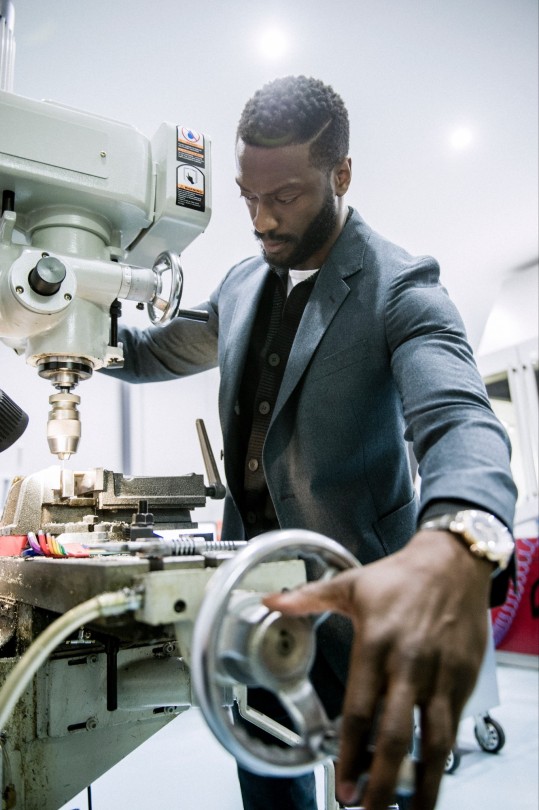
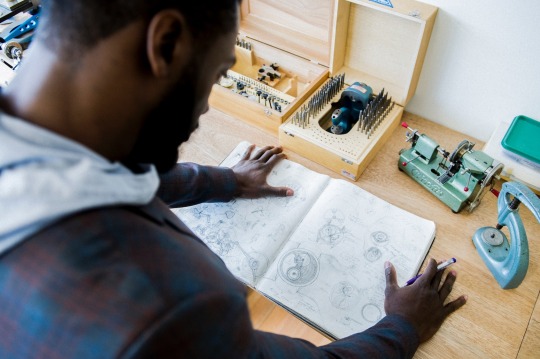

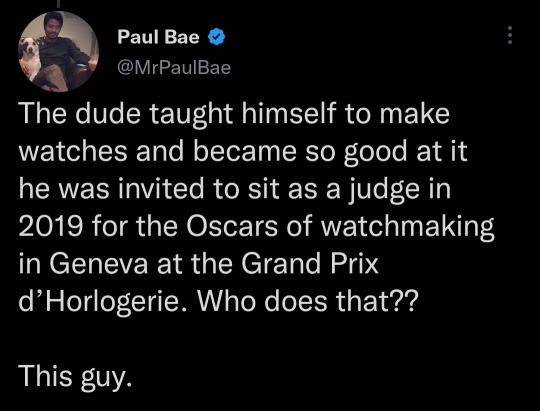



Just a couple of dudes reminding you that Aldis Hodge is, in fact, the sexiest man alive. In addition to being a horologist, he's also a painter and a violinist. He also went to school for architecture.
72K notes
·
View notes
Photo

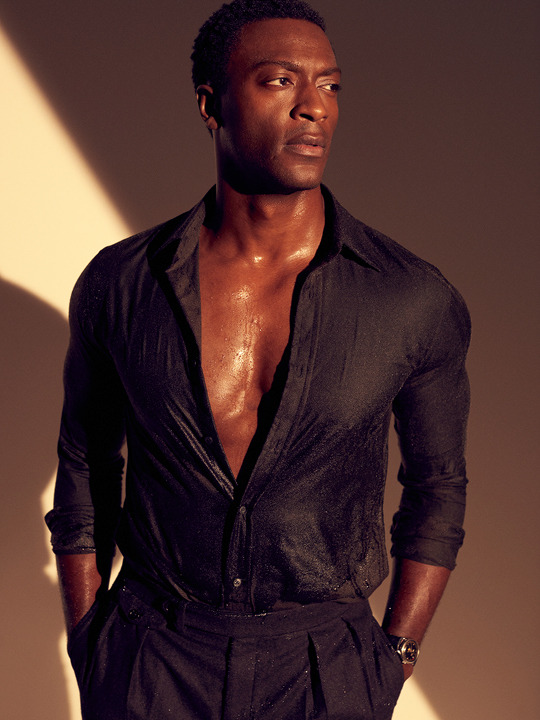
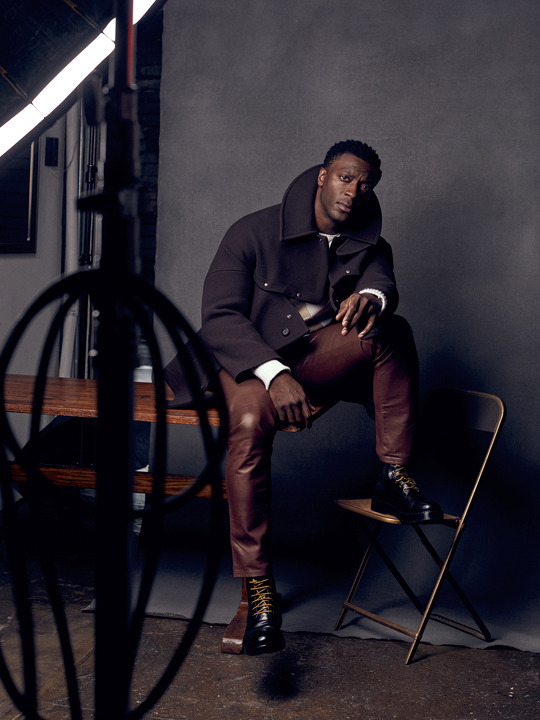
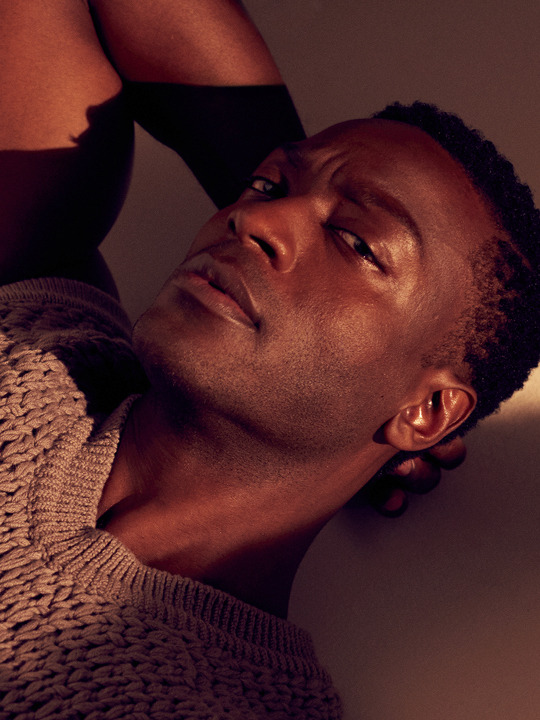




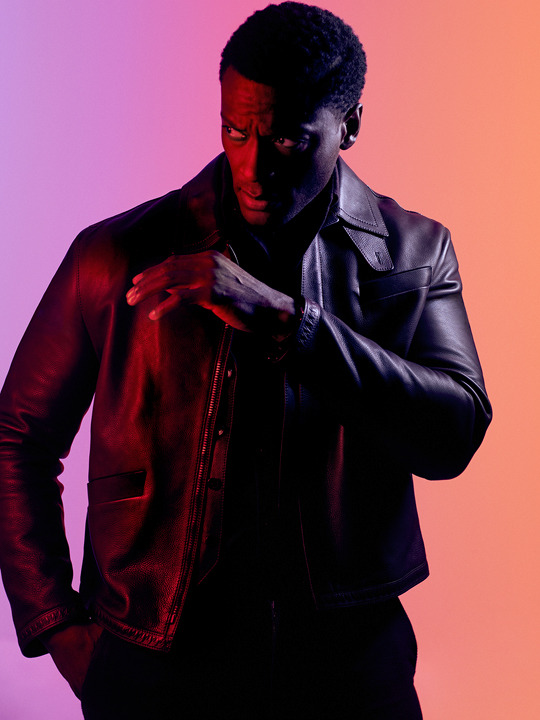

Aldis Hodge photographed by Alexi Lubomirski for Man About Town (2020)
7K notes
·
View notes
Text
always thinking about the season two finale in general but also how nate only had to ask eliot once to keep the rest of the crew safe bc for all that they butt heads and disagree nate knows that the one thing eliot won’t risk is parker, hardison, and sophie o-<-<
#leverage#txt: eliot#txt: nate#ep: s02e15#ep: the maltese falcon job#txt: leverage rewatch#note: i’m in the middle of my biannual rewatch and i’m crying
48 notes
·
View notes
Text
Quick shoutout to the most important background scene in which Eliot feeds Parker a bit of bell pepper while Hardison watches and drinks orange soda out of a wine glass
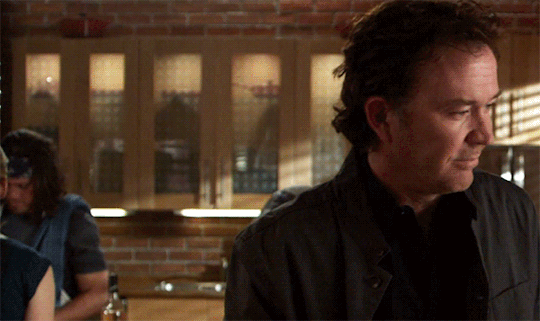
3K notes
·
View notes
Photo

most attractive image I’ve ever laid eyes on actually
#img: parker#img: hardison#img: leverage redemption#note: no actually they were so sexy for doing this 🥹💗#note: i’m crying i love them so much
5K notes
·
View notes
Text

#img: leverage redemption#img: harry#img: sophie#img: eliot#img: hardison#img: breanna#img: parker#note: eliot is the only one who can say this and be correct
2K notes
·
View notes
Photo
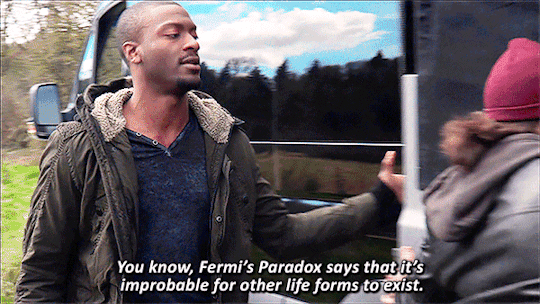
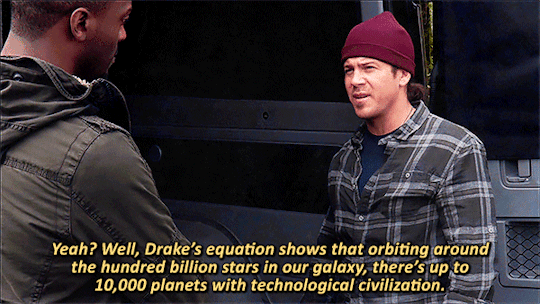



“We also unfortunately – we couldn’t do the flashback we wanted to do there which was Eliot going – when he goes ‘what, you have to fight an alien?’ We wanted to do the flashback of Eliot just like, covered in green goo with like, a Ka-Bar, just kinda panting. Just covered in green goo and just like a tail whipping around just as he kind of finishes the job. And we were just like ‘nah, we can’t. We can’t.’” - John Rogers, The First Contact Job DVD Commentary
#img: eliot#img: hardison#ep: s0503#ep: the first contact job#note: aaksndjsjajajha#note: that would’ve ended my entire life but in a good way
5K notes
·
View notes
Text
Hey, Leverage peeps. Y’know how Sophie is introduced playing Lady Macbeth in Shakespeare’s Macbeth? I (re)read the play recently for a class (yes, I’m a literature nerd who voluntarily takes classes involving Shakespeare, sue me), and it got me thinking.
Because, guys… there's definitely meaning behind that choice. Lady Macbeth’s character is an ambitious and manipulative woman who pulls her husband’s strings to gain power, only to be consumed be guilt. Sound familiar? Yeah. There’s a lot of parallels.
I’m guessing many of you haven’t read the play, so I’ll explain the bare bones of what you need to know for the meta. Macbeth is a play about a general/nobleman named, of course, Macbeth. At the beginning, he encounters three witches—they’re the origin of the “double, double toil and trouble / fire burn and cauldron bubble” phrase—who prophesize that Macbeth will become king. Macbeth describes his encounter to his wife, Lady Macbeth, who coerces him into murdering the current King Duncan. They work together to kill Duncan, and Macbeth ascends to the throne. He has numerous other people killed to keep his throne safe.
(Trigger warning for suicide mention! Skip to the next paragraph if you don’t want to read.) Both he and Lady Macbeth are consumed by guilt as the play goes on, though, and she goes more or less insane and eventually commits suicide. (Trigger warning over.)
If you’ve ever heard of “out, out, damned spot,” that’s Lady Macbeth agonizing over the metaphorical blood she can’t get off her hands.
So, how does this work with Sophie? Here’s the thing. Lady Macbeth is known as one of the characters, if not the character, that coined the “dangerously ambitious woman” trope. She’s determined to secure Macbeth’s position on the throne, mostly for the power it’ll gain her as Queen, and she pulls his strings over and over to get him to murder his way there.
Sophie is, of course, a grifter. Her entire skillset is designed to manipulate people—oftentimes rich and powerful men—to get what she wants. She isn’t necessarily ambitious so much as obsessed with stealing artwork and other valuables, but she enjoys the downfall of most of her marks. She luxuriates in the power of making people do what she wants them to.
And yet Lady Macbeth does eventually succumb to the guilt of everything she’s done… just as Sophie comes to recognize and regret the pain she’s wrought. Remember The King George Job?
“Nate: I know what you’re thinking, but it’s not the same thing.
Sophie: Oh, no. Of course it’s not. I stole from one rich man to sell to another rich man.
Nate: No one got hurt.
Sophie: That I know of. How do I know that innocent children were never used to shift my merchandise?”
(transcript)
In the same scene, she also says this:
“Listen, I know I grifted from filthy-rich wankers who hardly ever missed the money, of being taken for a ride. But this, this whole Moreau business has got me thinking. Keller steals from the rich, too, and a little girl ends up in detainment for it.”
She comes to recognize her past wrongdoings via the work she does with the crew, and at the same time begins to redeem herself for it. That prevents her from becoming consumed by guilt as Lady Macbeth does. The theme, however, remains consistent.
It’s also fascinating that Sophie refers to Nate as a “white knight, black king” in the very same episode as her initial (awful) performance as Lady Macbeth. White is often associated with purity and innocence, thus implying a “pure knight.” Macbeth himself is a noble and well-respected “knight” (technically general and nobleman, but it follows the same concept) before Lady Macbeth coerces him into murdering King Duncan. This parallels neatly with Nate as a “pure knight,” or an “honest man” (as Macbeth was before the play began).
Then, of course, we have “black king.” Black is a color frequently associated with sin, darkness, etc., and thus Macbeth could be seen as a “black king” himself: someone who has done great wrongs to reach his position of power. He’s turned into that “black king” by Lady Macbeth. Nate, meanwhile, is called the “black” chess king. He is metaphorically “corrupted”—arguably, by Sophie and the crew. (Of course, in Nate’s case, the “corruption” is a good thing and leads him to become a better person. But the parallel itself still stands.)
Chess is about strategy, manipulation, and cleverness. Sophie and Lady Macbeth are both very good at manipulating people into doing what they want them to for power’s sake. Nate is often referred to as the master chess player, where “chess” is the metaphor for cons. Yet realistically, Sophie is the best at playing “chess” with people. Not to mention that the king is, in many ways, not a powerful piece. It can only move one square at a time, and if it’s captured, its side loses. The queen is the most powerful piece on the chessboard. And here’s Sophie, referring to Nate as a chess piece.
(There’s something to be said here about how Sophie manipulates Nate both for his own good but also to her advantage, specifically in The First David Job and The Second David Job. But for the sake of keeping this meta at a reasonable length, I’ll leave it for now.)
“But Synapse!” I hear you cry. “Sophie's really bad at the Lady Macbeth speech in the first episode, but she’s fantastic in the last one! If she became a better person, wouldn’t it be the other way around?”
Fair point, friend, and it’s something I’ve been trying to figure out myself. Here’s my proposal:
I’m not an actor, but from what I understand, acting requires you to deeply empathize with your character. Conning isn’t dissimilar, but in a way, Sophie knows that when she cons, it is not her. She’s hiding everything she is for the sake of deception.
Regular acting, on the other hand, requires you to be exposed about yourself and who you are. You have to be willing to be vulnerable for your audience. And Sophie truly does not know how to be vulnerable, or indeed who she is at all. Of all the characters on Leverage, she’s always been the most mysterious about her past and her true depths.
In The Nigerian Job, Sophie claims she’s gone to a civilian life and dropped her grifting. She’s questioning the very thing that she loves to do, uncertain of herself and where she’s going with her life. Her ambition and drive have been, if not lost, undermined. We know that Sophie is a paradoxically compassionate and maternal person just as much as she is a master of the con. When she joins up with the crew, she near-immediately falls into a momfriend role to Parker, Hardison, and Eliot, and she’s an exceptional teacher.
Perhaps she struggles to find kinship in Lady Macbeth’s motivation in that first episode. She can’t act what she doesn’t understand. Plus, she has no outlet for the side of her that desperately wants to do good, and maybe that’s showing through in her inability to embrace being bad.
But in The Long Goodbye Job, Sophie aces her performance when she’s doing it for a con. Yet at that time she is arguably far less like Lady Macbeth than she is in the first episode. So what changes? What about the con makes it so much easier?
I’d say it’s a few things. Firstly, Sophie’s newfound stability. She knows who she is, and she knows that she is not Lady Macbeth. Her desire to teach and support others has a) been discovered and b) is being fulfilled. She’s found that her love for manipulation is most satisfying when directed at people who are maliciously uncaring and contradictory to her own morals. Thus, the ways her personality overlaps with Lady Macbeth’s can’t be destabilized by Sophie’s internal war over how much she really is like Lady Macbeth. She knows who she is, and she knows what parts of Lady Macbeth she can relate to and what parts she has to truly act out.
Moreover, she’s acting for a con: she knows the character she’s playing does not truly represent herself. Her mask is complete, rather than requiring pieces of herself to be exposed.
Compare Sophie’s performance in The Nigerian Job to the part of Lady Macbeth’s soliloquy she’s attempting to recite (yes, I’ll explain the bits of the soliloquy that I reference, don’t worry):
“Sophie: Come, you spirits that tend on mortal thoughts, unsex me here, and fill me from the crown to the toe top-full of direst! Make thick my blood;
Sophie: Stop up the access and passage to remorse, that no… (she hesitates and restarts her line) That no compunctious visitings of nature”
(transcript)
Versus the original soliloquy:
“Come, you spirits
That tend on mortal thoughts, unsex me here,
And fill me, from the crown to the toe, top-full
Of direst cruelty! make thick my blood,
Stop up th’ access and passage to remorse,
That no compunctious visitings of nature
Shake my fell purpose, nor keep peace between
Th’ effect and it! Come to my woman’s breasts,
And take my milk for gall, your murd’ring ministers,
Wherever in your sightless substances
You wait on nature’s mischief!”
(Macbeth, Act I, Scene V, lines 45-55; I’ve bolded the lines Sophie recites)
Note where Sophie trips up: she loses the word “cruelty” from “of direst cruelty” first, and then she hesitates on the lines “stop up the access and passage to remorse / that no compunctious visitings of nature / shake my fell purpose”. If the latter line is gobbledygook to you, it basically means “stop me from feeling guilty so my guilt can’t get in the way of my awful plans.”
So where is Sophie hesitating? On the maliciousness of Lady Macbeth, and on her desire to feel no remorse. And what do we know about Sophie? That she is a) still inherently kind, and b) that she does feel remorse for the pain she’s caused—or at least that she learns to feel it over the course of the show.
By the way, it’s interesting that Lady Macbeth’s bit about “take my milk for gall” is excluded too, because it’s sort of like her saying “turn any motherly feelings/kindness I feel into cruelty.” Compare that against Sophie’s maternal attitude. It’s probably not massively significant, given that there wasn’t a need for more than a couple lines for the writing of the show, but I find it interesting.
Now, compare this to Sophie’s performance in The Long Goodbye Job:
“Sophie (wonderfully): Come, you spirits that tend on mortal thoughts, fill me from the crown to the toe, top-full of direst cruelty. Make thick my blood. Stop up the access and passage to remorse.”
(transcript)
She’s completely on-point. I’d say this is both because she’s doing it for a con and doesn’t feel internal conflict over it, but also because the marks deserve no mercy. The Black Book is full of people who have done awful things in the name of greed. Why should she feel guilt over dethroning them?
TL;DR: Sophie plays a character who simultaneously parallels and contradicts her. Lady Macbeth is manipulative and ambitious, much like Sophie, but also cruel and malicious, which is not very Sophie-like. Yet Lady Macbeth does eventually go crazy from guilt and remorse—and Sophie also has to learn how to deal with her guilt.
This is why Sophie struggles so much in her first performance: she’s questioning her identity in relationship to her similarities with Lady Macbeth. At the end, however, she’s become confident in who she is. She’s also learned to use her skills to destroy those who take advantage of their power to hurt others, rather than good men like King Duncan.
In fact, she’s dethroning people who are greedy for power… people who are not so dissimilar to Macbeth and Lady Macbeth themselves. Sophie has become their antithesis.
Damn, but this show is good.
208 notes
·
View notes
Text

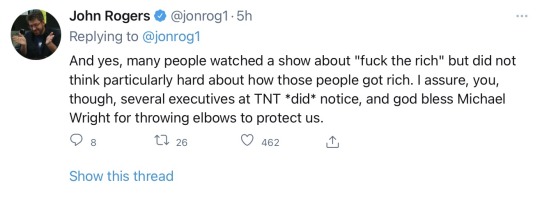


John Rogers (@jonrog1) Tweeted on August 19, 2021: Good day to get an angry email on [my old] website address about how we ruined LEVERAGE by making the sequel "woke" as a right wing terrorist is parked with a VBIED in Washington DC.
John Rogers (@jonrog1) Tweeted on August 19, 2021: And yes, many people watched a show about "fuck the rich" but did not think particularly hard about how those people got rich. I assure, you, though, several executives at TNT *did* notice, and god bless Michael Wright for throwing elbows to protect us.
BurningTea (@humanformdragon) Tweeted on August 19, 2021: @jonrog1 Congratulations on achieving the same level of misunderstanding as that applied to Star Trek!
John Rogers (@jonrog1) Tweeted on August 19, 2021: I can't speak for the other writers, but I will take this as a point of pride.
John Rogers (@jonrog1) Tweeted on August 19, 2021: The hilarious thing is that I think Breanna's speech in Ep 3 set him off, and I wrote that. It was supposed to be in Ep 2 but we ran out of room, so Kate let me jam it in there. So it's literally the old school writer he's bitching about.
#img: john rogers#txt: leverage redemption#note: i have to laugh like the og series laid everything out there and literally approached leverage the same way they are with redemption#note: it’s staying true to its source material and people are rlly just that dumb
2K notes
·
View notes
Text
here’s some am*zon reviews of leverage: redemption that make me want to mcfuckin’ lose it from the sheer irony





and my personal favorite:

#leverage#leverage redemption#img: leverage redemption#note: all the bad reviews i didn’t include are mostly talking abt breanna and how much they hate her bc she’s too young and Woke#note: and so many people had a problem with the n*zi comment and started acting as if n*sis are long gone and only exist in the 1920s#note: the last one is phenomenal bc they clearly didn’t watch the og seasons…..hardison…cool???? shouldn’t talk?????#note: my boy RAN his mouth and i love him for it#note: oh and all the reviews mentioning hutton as if rogers didn’t straight up warn the cast from the start that if they fucked up he’d#note: write them out of the show in a heartbeat
137 notes
·
View notes
Text
Crushed to inform you that there are reviews on the Leverage revival that claim it’s “too woke” and “didn’t used to take sides.”
I knew it would happen, but I’m still baffled that you can be a fan of a show and misrepresent it so terribly.
#txt: leverage redemption#note: TOO WOKE????? WHAT SHOW HAVE Y’ALL BEEN WATCHING#note: @ redemption show runners i’m so sorry#note: were they just watching seasons 1-5 like ‘oh wow these are funny scenarios that couldn’t possibly have any real world counterparts :)’#note: ‘oh man! those rich businessmen corrupt political figures and ruthless mega corporations are so scary! thank god they don’t exist!’#note: were none of them slapped firmly in the face with the walmart episode where they were basically three steps away from going#note: ‘FUCK WALMART ALL MY FRIENDS HATE WALMART’ every other minute i’m baffled
7K notes
·
View notes
